Exercises (3162)
Pyramid training (medium-long): 600-800-1000-1500-1000-800-600
Pyramid training
Single run or in strength groups, with the pacemaker controlling the time
Pyramid training is a special type of interval training that can be run extensively (longer sections at a brisk pace) or intensively (shorter sections at a very fast pace). As the name suggests, the effort initially increases continuously (in the form of a staircase) and is then reduced again to the same extent. There is always a trotting break between the efforts, which is measured by the intensity of the effort. The units should be run so fast that an interval can just be added at the end (extensive) or another interval would no longer feel possible (intensive). It is important to concentrate on an optimal running technique, because as soon as you are no longer running "cleanly", you are travelling too fast. The individual intervals are run very quickly, but as evenly as possible (the shorter the effort, the higher the intensity and vice versa). For shorter workouts, you cannot rely completely on the heart rate for intensity levels, as the heart rate only adapts to the exertion with a slight delay at the start of the workout.
Running training with alternating exertion and recovery:
- 600m exertion (intensity level: 4)
- 800m exertion (intensity level: 4)
- 1000m exertion (intensity level: 3-4)
- 1500m exertion (intensity level: 3-4)
- 1000m exertion (intensity level: 3-4)
- 800m exertion (intensity level: 4)
- 600m effort (intensity level: 4)
Pause: 200-400m each time
Intensity level 3:
HFmax: 80-90%
Rule of speech: speak in complete sentences
Intensity level 4:
HFmax: 90-95%
Rule of speech: concise exchange of words
Pyramid training can be completed both on a track and off-road. Running on the track has the advantage that the runner always has control over the distance and the current running pace, which can promote the development of a sense of speed. Whether on the track or off-road, the distances to be covered must be clearly defined for the participants (distance markings). It may also be the case that a turning point is defined if the total distance is not long enough (determine running directions to avoid collisions). After the exertion phase, the participants continue to trot at a relaxed pace until they reach the marker for the next exertion phase (variation: march). To ensure that the participants have enough space for the run, it makes sense to stagger them (spread them out on the track or send them out on the track in a staggered manner). Pyramid training can be carried out as follows:
- Round course: To ensure that the participants have enough space available for the run, they can be spread out on the round course at the start. The participants/groups start the intervals independently, complete the prescribed distances and, if desired, measure the times (note the times so that the same distances are completed in approximately the same time - note-taking is almost impossible to implement in practice). The participants themselves decide how they spend the breaks (e.g. marching or relaxed trotting - however, the same form of recovery should always be maintained in a training session). During the recovery phase, care is taken to ensure that no participants who are in a stress phase are disturbed.
- Distance of at least 1700 metres: Distances are marked with signs (every 25-50 metres). Each participant/group completes the specified distances independently according to the instructions of the sports director (observe running directions so that the total length of the course is sufficient). The times for the respective sections of the course can be recorded independently by the participants if desired (comparison of identical sections). The participants/groups cover the distances to the start of the next interval by marching or at a relaxed trot (keep the same form for training). There is the option of staggering the start of the participants, whereby the running routes must be clearly defined in order to avoid collisions.
- Long-distance circuit: The distances are marked with signs (every 25-50 metres). In the recovery phases, the participants/groups march or trot until the next interval start is marked (always choose the same type of break in a training session). The participants can time the different sections of the course so that the same distances can be compared with each other. After the last interval unit, all runners return to the starting point, which takes additional time. Ideally, the running distance corresponds approximately to the distance that can be covered in the time available in order to generate as little additional displacement time as possible (e.g. 7.9km with 3x200m, 2x300m and 1x400m break sections).
Distance markers (signs with metres)
Evaluation FTA (group formation)
Participant:
1 heart rate monitor
Participant/group:
1 stopwatch
Pyramid training (medium-long): 600-800-1200-1500-1200-800-600
Pyramid training
Single run or in strength groups, with the pacemaker controlling the time
Pyramid training is a special type of interval training that can be run extensively (longer sections at a brisk pace) or intensively (shorter sections at a very fast pace). As the name suggests, the effort initially increases continuously (in the form of a staircase) and is then reduced again to the same extent. There is always a trotting break between the efforts, which is measured by the intensity of the effort. The units should be run so fast that an interval can just be added at the end (extensive) or another interval would no longer feel possible (intensive). It is important to concentrate on an optimal running technique, because as soon as you are no longer running "cleanly", you are travelling too fast. The individual intervals are run very quickly, but as evenly as possible (the shorter the effort, the higher the intensity and vice versa). For shorter workouts, you cannot rely completely on the heart rate for intensity levels, as the heart rate only adapts to the exertion with a slight delay at the start of the workout.
Running training with alternating exertion and recovery:
- 600m exertion (intensity level: 4)
- 800m exertion (intensity level: 4)
- 1200m exertion (intensity level: 3-4)
- 1500m exertion (intensity level: 3-4)
- 1200m exertion (intensity level: 3-4)
- 800m exertion (intensity level: 4)
- 600m effort (intensity level: 4)
Pause: 200-400m each time
Intensity level 3:
HFmax: 80-90%
Rule of speech: speak in complete sentences
Intensity level 4:
HFmax: 90-95%
Rule of speech: concise exchange of words
Pyramid training can be completed both on a track and off-road. Running on the track has the advantage that the runner always has control over the distance and the current running pace, which can promote the development of a sense of speed. Whether on the track or off-road, the distances to be covered must be clearly defined for the participants (distance markings). It may also be the case that a turning point is defined if the total distance is not long enough (determine running directions to avoid collisions). After the exertion phase, the participants continue to trot at a relaxed pace until they reach the marker for the next exertion phase (variation: march). To ensure that the participants have enough space for the run, it makes sense to stagger them (spread them out on the track or send them out on the track in a staggered manner). Pyramid training can be carried out as follows:
- Round course: To ensure that the participants have enough space available for the run, they can be spread out on the round course at the start. The participants/groups start the intervals independently, complete the prescribed distances and, if desired, measure the times (note the times so that the same distances are completed in approximately the same time - note-taking is almost impossible to implement in practice). The participants themselves decide how they spend the breaks (e.g. marching or relaxed trotting - however, the same form of recovery should always be maintained in a training session). During the recovery phase, care is taken to ensure that no participants who are in a stress phase are disturbed.
- Distance of at least 2000 metres: Distances are marked with signs (every 25-50 metres). Each participant/group completes the specified distances independently according to the instructions of the sports director (observe running directions so that the total length of the course is sufficient). The times for the respective sections of the course can be recorded independently by the participants if desired (comparison of identical sections). The participants/groups cover the distances to the start of the next interval by marching or at a relaxed trot (keep the same form for training). There is the option of staggering the start of the participants, whereby the running routes must be clearly defined in order to avoid collisions.
- Long-distance circuit: The distances are marked with signs (every 25-50 metres). In the recovery phases, the participants/groups march or trot until the next interval start is marked (always choose the same type of break in a training session). The participants can time the different sections of the course so that the same distances can be compared with each other. After the last interval unit, all runners return to the starting point, which takes additional time. Ideally, the running distance corresponds approximately to the distance that can be covered in the time available in order to generate as little additional displacement time as possible (e.g. 8.3km with 3x200m, 2x300m and 1x400m interval sections).
Distance markers (signs with metres)
Evaluation FTA (group formation)
Participant:
1 heart rate monitor
Participant/group:
1 stopwatch
Pyramid training (medium): 45-60-90-60-45
Pyramid training
Single run or in strength groups, with the pacemaker controlling the time
Pyramid training is a special type of interval training that can be run extensively (longer sections at a brisk pace) or intensively (shorter sections at a very fast pace). As the name suggests, the effort initially increases continuously (in the form of a staircase) and is then reduced again to the same extent. There is always a trotting break between the efforts, which is measured by the intensity of the effort. The units should be run so fast that an interval can just be added at the end (extensive) or another interval would no longer feel possible (intensive). It is important to concentrate on an optimal running technique, because as soon as you are no longer running "cleanly", you are travelling too fast. The individual intervals are run very quickly, but as evenly as possible (the shorter the effort, the higher the intensity and vice versa). For shorter workouts, you cannot rely completely on the heart rate for intensity levels, as the heart rate only adapts to the exertion with a slight delay at the start of the workout.
Running training with alternating effort and recovery:
- 45 seconds of effort (intensity level: 4-5) - 45 seconds of rest
- 60 seconds of effort (intensity level: 4-5) - 60 seconds of rest
- 90 seconds of effort (intensity level: 4) - 60 seconds of rest
- 60 seconds of effort (intensity level: 4-5) - 45 seconds of rest
- 45 seconds of effort (intensity level: 4-5)
Intensity level 4:
HFmax: 90-95%
Rule of speech: brief exchange of words
Intensity level 5:
HFmax: 95-100%
Rule of speech: No more exchange of words possible
The pyramid training can be carried out as follows:
- Round track: To ensure that the participants have enough space available for the run, they can be spread out on the round track for the start. The sports director has all participants in view and can therefore start or stop the intervals by signalling. The participants decide for themselves how to spend the breaks (e.g. on the spot, marching or at a relaxed trot).
- Distance of at least 700 metres: Distances are marked with signs (every 25-50 metres). Each participant receives a stop/pulse watch, runs along the specified route for the duration of the respective exercise (observe the running directions as specified by the sports director so that the total length of the route is sufficient) and calculates the distance covered. It is possible for participants to start in stages, whereby the running routes must be determined in order to avoid collisions. If the course allows it, the sports director can give the start/stop signal for all participants (no staggering possible).
- Longer distance race: The distances are marked with signs (every 25-50m). Each participant receives a stop/pulse watch, runs the course independently and calculates the distance travelled (no staggered start of the participants necessary). During the breaks, participants wait in place or continue running at a relaxed trot until the break time has elapsed. After the last run, all runners return to the starting point, which takes additional time. Ideally, the running distance corresponds approximately to the distance that can be covered in the time available in order to generate as little additional displacement time as possible.
With the same duration of exertion, an attempt is made to ensure that the participants/groups also reach the same distance. However, there is very little time to calculate and record the distances, which makes it difficult to compare runs of the same duration in practice.
Distance markers (signs with metres)
1 signalling instrument (e.g. whistle)
FTA evaluation (group formation)
Per participant:
1 heart rate monitor
For sports leader or per participant/group:
1 stopwatch
Cross stand
Coordination exercises
Individual work
Both feet point in the same direction, the gaze and shoulders are directed towards the end point of the slackline, the arms are at a 90 degree angle to the slackline (slalckline and arms form a '+' sign), feet at least hip-width apart, knees slightly bent.
Lighten the load:
Perform the exercise close to the attachment; stretch the slackline tightly over a short distance (3-5m); sit a partner in the middle of the slackline to dampen the initial trembling; help a partner by holding their hand (always go with the balancing movement and only stabilise if the slackliner is about to fall).
Make it harder:
Stretch the slackline over a long distance.
1 Slackline
Rad
Floor and apparatus gymnastics









Stepping position, arms held high, pushing leg in front, lifting the swinging leg and lowering the torso, placing the front hand on the floor and turning the body to the side, pushing with the pushing leg and placing the second hand, swinging up to a straddled side handstand, quickly lowering and placing the swinging leg and then straightening up to stand upright.
Variant:
One-handed wheel, jumped wheel, wheel turn (rondat).
The participants practise the movement form independently using series of pictures or based on the instructor's demonstration of the exercise. The instructor (or a partner) gives feedback, provides support and checks that the exercise is being performed correctly.
4 soft mats (small) ► indoor version
1 row
outdoor:
turf field
Wheel turn
Floor and apparatus gymnastics
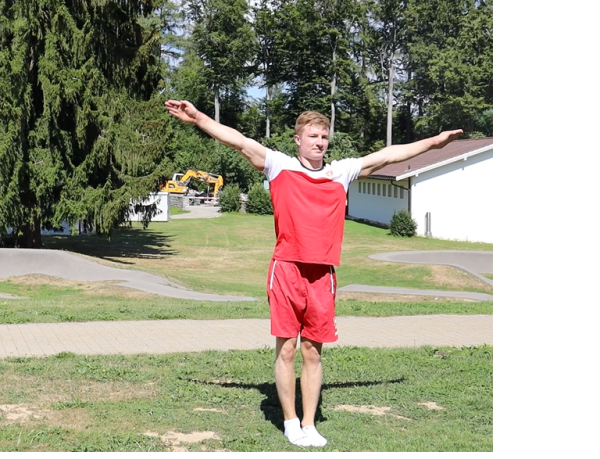








Hops, forward swing of the arms, placing the front leg on the floor, placing the arms on the floor and swinging into the side handstand (back hand parallel and front hand transverse to the direction of movement), closing the legs, push-off from the shoulders with a slight turn to land in the standing position facing the starting position.
The participants practise the movement form independently using series pictures or based on the demonstration of the exercise by the sports instructor. The instructor (or a partner) gives feedback, provides support and checks the correct execution of the exercise.
4 soft mats (small) ► indoor version
1 row
outdoor:
turf field
Reaction ball
Increase pulse
Group work
Groups of 2
The person behind passes the ball (by hand or foot) between the legs of the person in front, who must react and stop the ball before a certain line.
Variant:
Vary the starting position of the person in front (e.g. kneeling, passing the ball on the side or lying down, lifting the ball over the body).
Per group:
1 ball (football, volleyball, basketball, smolball or handball)
Reaction ball
Increase pulse
Group work
Groups of 2
The person behind plays the ball between the legs of the person in front, who must react and stop the ball in front of a certain line.
Variant:
Vary the starting position of the person in front (e.g. kneeling, passing the ball to the side or lying down, lifting the ball over the body).
Pro Gruppe:
1 Intercross-/Unihockeyball
Pro Tn:
1 Intercross-/Unihockey-Stock
Reaction trapping
Coordination exercises
Partner work
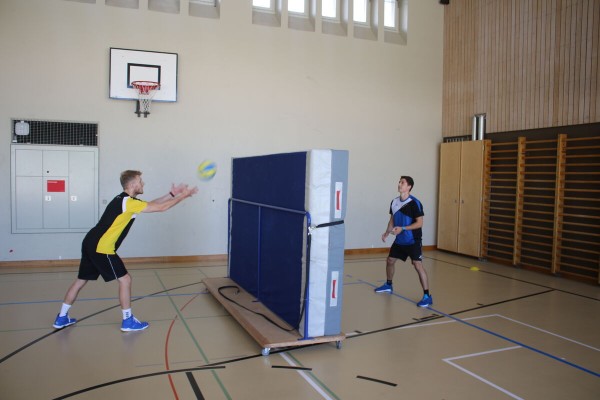
The participants throw a volleyball to each other over a thick mat into a field of approx. 5-6 metres defined by marker cones. To prevent an opponent scoring a point, the ball must be caught before it touches the ground. Throws that do not reach the playing field or get stuck on the mat result in a point for the opponent. Throws are only allowed from bottom to top.
► Reactivity
1 mat trolley (large; incl. mat)
1 volleyball
4 cones
Post setup:
The mat trolley serves as a boundary between the two halves of the playing field. The size of the playing field is marked with cones
Reaction trapping
Coordination exercises
Partner work
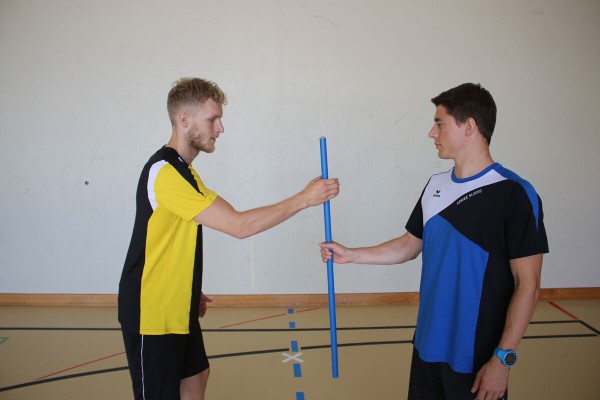
One participant supports themselves with their forearm on a vaulting box and holds their hand slightly open. His partner holds a stick (or floorball stick) in the opening of the active participant's hand (distance between palm and stick: approx. 1cm) with the end of the stick at the bottom edge of the hand. If the partner drops the stick, the active participant tries to catch it as quickly as possible.
Variant:
Perform the exercise simultaneously with both hands and one stick per hand. Only one stick is dropped at a time (choice reaction).
► Reactivity
1 vaulting box
1-2 (wooden) sticks or floorball sticks
Reaction trapping
Coordination exercises
Partner work
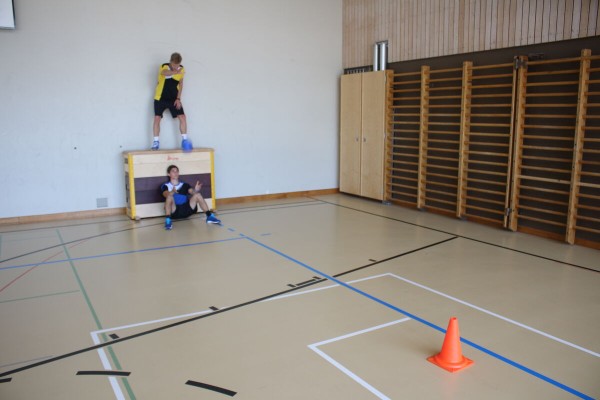
One participant sits on the floor with their back against the vaulting box. His legs are spread apart, his arms are held out in front of him and his gaze is fixed on a marker cone about 5-6 metres in front of him. The partner kneels/stands on the vaulting box and drops a foam/softball with their arms outstretched forwards. The seated participant tries to catch the ball before it falls to the floor. After a few attempts, the roles are swapped.
► Reactivity
1 vaulting box ► indoor version
1 marker cone/cap
1 foam/softball
Indoor set-up:
A marker cone/cap is located approximately 5-6 metres from the vaulting box.
Outdoor version:
Without vaulting box; the partner stands on the ground.
Reaction trapping
Increase pulse
Partner work
Groups of 2
Two participants stand, lie, sit or kneel opposite each other. A game is played together. As soon as the result is clear, the loser sprints away from their partner to a defined line. The winner tries to catch their partner before they reach the finish line.
Possible game variations:
- Scissors, rock, paper: scissors beats paper, rock beats scissors, paper beats rock.
- Even, odd: the participants on one side get the even numbers, while the other side gets the odd numbers.
Variant I:
The game leader raises a certain number of fingers, if this number is even, the participant with the even numbers becomes the catcher (reversed roles for odd numbers).
Variant II:
Both participants show a number of fingers on an agreed signal. If the sum of the fingers raised is even, the participant with the even numbers becomes the catcher (reversed roles if the sum is odd).
Variant III:
The sports leader sets a maths task, depending on the result (even or odd), the corresponding participant becomes the catcher.
No material required
Reaction pass game
Coordination exercises
Partner work
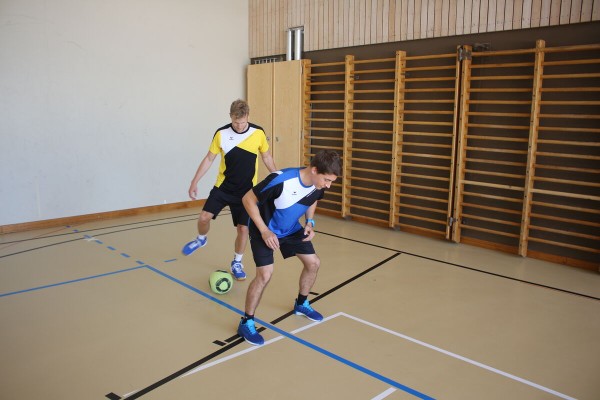
The participants stand behind each other, the participant at the back is equipped with a futsal/football. The person behind passes the ball to their partner from behind between their legs or throws it forwards over their partner's head. The partner must react as quickly as possible and intercept/stop the ball as early as possible. After a few attempts, the roles are reversed.
► Reactivity
1 Futsal/football
Reaction pass game
Coordination exercises
Partner work
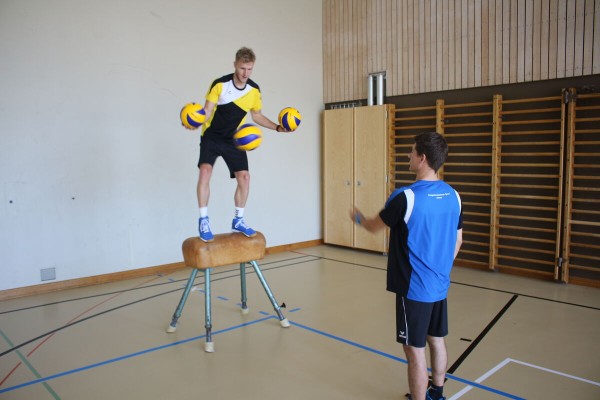
A participant stands on a pommel horse. He has his hands stretched out to the side and is holding a volleyball in each hand. The second participant stands approx. 1-2 metres in front of the pommel horse and throws another volleyball to the participant standing on the horse. If the pass goes to the head, the ball is passed back with the head. If the pass comes to the feet, the ball is passed back with the left or right foot (depending on the side of the pass). If the pass comes to one of the outstretched arms, the ball held in the hands must be passed to the partner and the new ball must be caught. The passer can make the exercise easier or more difficult by looking at where the pass is made or not. After a few attempts, the roles are swapped.
► Balance and reaction skills
1 pommel horse
3 volleyballs
Reaction rope
Increase pulse
Group work
Groups of 2
Two participants are given a skipping rope and each grasp it at the ends. They start to run one behind the other, keeping the rope taut (keep your distance). At a signal (e.g. whistle from the sports leader), both participants drop the skipping rope and the person behind tries to catch the person in front within a certain time (e.g. until the next whistle from the sports leader after 5-8 seconds). In the next round, the roles are swapped or a new partner is found. Under certain circumstances, an additional task can be introduced if the person behind catches the person in front (e.g. push-ups or stretch jumps).
Variant:
The rope can also be cut in half or thirds.
Per group:
1 skipping rope
1 hand whistle
Reaction game: catch
Increase pulse
Partner work
Groups of 2
Also change groups
Participants learn through play how to react correctly to a signal and accelerate quickly.
Two participants duel each other. Both have the same distance to a centre line and a finish line on their side. At a signal from the game leader, the participants either try to reach their finish line or catch their opponent before he reaches his finish line.
Starting position: sitting, lying, kneeling, push-up position, etc.
Command: shout from the game leader (left/right), acoustic signal from the game leader (one whistle = left, two whistles = right), visual indication of the race direction by the game leader, story with agreed signal words (with the signal word run on the corresponding side).
Variant:
Scissors-rock-paper: loser runs away
At a signal from the sports leader, show any number of fingers, total even = left, total odd = right.
No material required
Reaction game: capture marking cones
Stimulate circulation
Group work
Groups of 2
Participants react quickly and correctly to a signal (visual, acoustic, tactile) and perform a defined task. This trains their perception and ability to react.
The aim of this game is to catch the marking cone in the corresponding colour on command.
The participants line up in pairs in an inner and outer circle. Three marking cones in different colours are placed between each pair. The game leader now calls out various commands and the players react as quickly as possible.
Hair, nose, shoulder, stomach, knees, feet, etc. = touch the corresponding body parts with both hands
Left, right = move one position to the left/right
Colour = catch the marking cone in the corresponding colour
Whoever wins a duel receives a point. The game continues with the next commands.
Variant:
In a row without left/right command and change of position.
Only one marking cone per position (use a different command instead of colour)
Per group of 2:
3 marking cones in 3 colours
Rulebook
Transition main part
The sports manager explains the rules of the game form used in the main part to the participants (including organisational information).
Rulebook
Miscellaneous
The sports manager explains the rules of the game form used in the main part to the participants (including organisational information).
Tyre guard
Stimulate circulation
Group work
2 teams
One team guards hoops, each containing one cone. There are more hoops than defenders. The other team tries to knock over the cones with a ball. Guards are not allowed to stand in the hoops or guide the ball. Bouncing with the ball is not allowed and the number of steps (e.g. maximum 3 steps) with the ball is limited. Which team scores more points in a given time?
Variant:
Multiple balls.
1-3 balls (e.g. foam/softball, handball)
x Hoops
x Marking cones or clubs
x Playing ribbons/ribbons ► Team identification
Tyre guard
Stimulate circulation
Group work
2 teams
One team guards hoops, each containing one cone. There are more hoops than defenders. The other team tries to knock over the cones with a ball. Guards are not allowed to stand in the hoops or guide the ball. The rules of the respective game form (futsal/football, floorball) apply. Which team scores more points in a given time?
Variant:
Multiple balls.
Per participant:
1 stick ►floor hockey
1-3 balls ►futsal/football, floor hockey
x hoops
x marking cones or clubs
x wristbands/discs ►team identification
Tyre guard
Stimulate circulation
Group work
2 teams
Two teams play against each other in a limited playing area. A point is scored if a pass is made to a teammate who has at least one leg in a hoop. The defending team can block a hoop by placing a foot in it so that no points can be scored there (more hoops than defenders are therefore required for this type of exercise). The right to attack changes either after a certain time or after each loss of the ball or disc. The rules of the respective game form naturally apply (e.g. Smolball, Intercrosse/Lacrosse, Floorball, Frisbee Ultimate, Howler).
Variant I:
The exercise form can be played with all balls, throwing discs or game equipment. The throwing/passing technique or the passing technique can be specified.
Variant II:
Use more than one ball.
Participant:
1 stick/stick ►Intercrosse/Lacross, Smolball, Floorball
1-3 balls ►Basketball, Blitzball/Touchrugby, Frisbee Ultimate, FooBaSKILL, Futsal/Football, Handball, Intercrosse/Lacross, Smolball, Tchoukball, Floorball
4 marking cones/caps ►Field markings (optional)
x hoops
x playing ribbons/rubbers ►Team identification
Tyre guard
Forms of play / exercises
Group work
2 teams
Two teams play against each other in a limited playing area. A point is scored if a pass is made to a teammate who has at least one leg in a hoop. The defending team can block a hoop by placing a foot in it so that no points can be scored there (more hoops than defenders are needed for this type of exercise). The right to attack changes either after a certain time or after each loss of the ball or disc. The rules of the respective game form naturally apply (e.g. Smolball, Intercrosse/Lacrosse, Floorball, Frisbee Ultimate, Howler).
Variant I:
The exercise form can be played with all balls, throwing discs or game equipment. The throwing/passing technique or passing technique can be specified.
Variant II:
Use more than one ball.
Participant:
1 stick/stick ►Intercrosse/Lacross, Smolball, Floorball
1-3 balls ►Basketball, Blitzball/Touchrugby, Frisbee Ultimate, FooBaSKILL, Futsal/Football, Handball, Intercrosse/Lacross, Smolball, Tchoukball, Floorball
4 marking cones/caps ►Field markings (optional)
x hoops
x playing ribbons/rubbers ►Team identification
Tyre jumping
Coordination exercises
Individual work
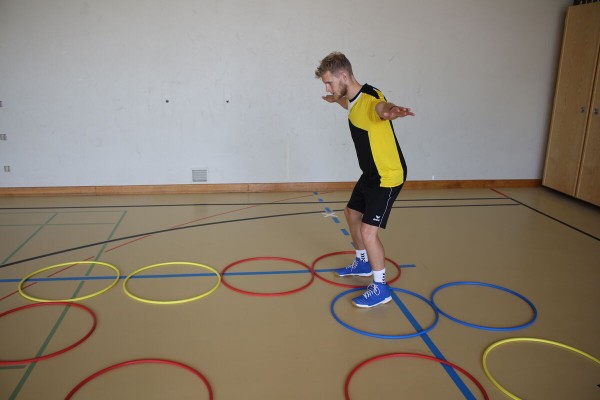
The participant hops over the tyres distributed on the floor. If two hoops are at the same height, both legs are used. Individual hoops are passed with the leg corresponding to the respective side. The hoops can be jumped through forwards or backwards. To make hoop jumping more difficult, the respective arm on the same or even opposite side can be lifted or stretched to the side at the same time when standing.
► Rhythmisation ability, orientation ability, balance ability
20-30 tyres
Post set-up:
Lay out the tyres to form a jumping course.
Tyre relay
Increase pulse
Group work
4-6 participants per group
The first participant in the group runs (alone) to the turnaround, slips through a tyre there and runs back to the group. Now the first participant runs with the second participant (holding hands) to the turning point, where they have to slip through the tyre again. The hands must not be released. This scenario is repeated until the entire group has slipped through the hoop (together with constant hand grasping). After this round, the first participant (who has travelled the longest so far) is allowed to disengage and the remaining group members continue the exercise. Finally, only the participant who was the last to join the group runs. At the end, all participants in the group have completed the same number of runs. Which group was the first to complete the task?
Per group:
2 colouring sticks
1 tyre